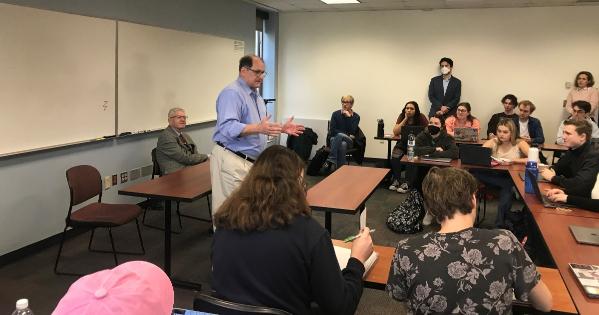Congress to Campus Hits SPA

On March 1, former U.S. Congressmen Mike Capuano (D-MA) and Tim Petri (R-WI) delivered guest lectures at American University political science classes, giving students a rare look inside the lawmaking process and underscoring the importance of civic engagement.
The visit was part of Congress to Campus, a program organized by a Washington, D.C. nonprofit that arranges for retired members of Congress (one Republican and one Democrat) to talk at colleges and universities about their political experience and showcase civility in political discourse.
In today’s polarized political environment, candidates often campaign on a “no compromise” platform to avoid the image of “selling out.” Capuano likes and respects Petri, he said, a representative of Wisconsin’s 6th district from 1979-2015, regardless of their differing positions on certain issues. Together, they urged students to elect lawmakers who are willing to listen and build trust across the aisle.
“If you want to accomplish anything in government at any level, you have to be willing to compromise,” said Capuano, who represented the Boston metropolitan district from 1999-2019. “I never remember any bill I voted on where I agreed with everything in it.”
The congressmen first met with SPA Assistant Professor Andrew Ballard’s Congress and Legislative Behavior (GOVT 321) class, which was studying federal budgeting.
“The budget process is convoluted for a reason,” Capuano said. “It’s meant to be messy and sloppy so everybody can have a chance of having a voice.” To fix the broken system, he said, citizens should get more involved, particularly by voting in primary elections to support moderates willing to reach consensus.
Petri added that constituents may not understand the difference between authorization and appropriation of government money, which can lead politicians to flaunt support for programs—often just before an election—without actually voting to fund them.
The lawmakers spoke candidly about the challenges of the job, from raising money to reaching voters and dealing with social media. They revealed the thought processes behind crucial votes, including weighing the wishes of their constituents against what they considered best for the country—and, at times, the prospect of defending their positions back home.
Stefan Mandic, SPA/BA ’23, was struck by the speakers’ suggested tactics for negotiating with colleagues and connecting with voters, specifically strong social and communication skills, and how the legislative process compared to classroom theorizing.
“It was surprising how much they stressed that not everything is going to go your way,” said the political science major. “There will be obstacles. I found it quite enriching to have individuals of such political caliber [share] what’s happening on the ground.”
The pair also addressed students in Introduction to Political Research (GOVT 310), taught by Matthew Foster.
“I was glad my students just got an opportunity to hear what’s really going on behind the scenes—how Congressmen interact, how deals get done, and how committees get selected,” Foster said.
“This was a perfect way for the students to see how the concepts we talk about in our class on Congress get put into practice,” Ballard agreed. “I hope it is an experience they'll remember for a long time.”
While public attention is often focused on national politics, both congressmen encouraged students to consider getting involved in local school boards, city councils, and county commissions.
“Everyone in this room has the opportunity to put your hat in the ring and do some public service,” Petri said. “You learn a lot and it’s interesting.”
Both speakers expressed dismay with the rancor in Congress today and the threat it poses to society. Capuano, who held many offices, including mayor, before coming to Congress, declared the participation of young Americans to be the key to the nation’s pressing problems.
“Don’t quit,” he said. “Don’t get walk away. Don’t get disgusted. Government and politics are nasty. It’s hard work. But it is worse for democracy, for this country, and for the world if your generation gives up.”
